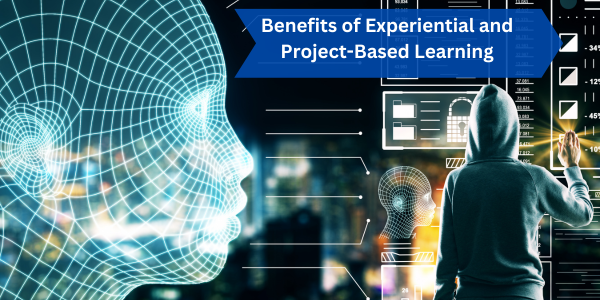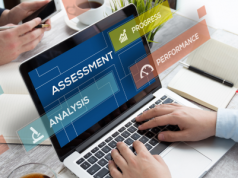 Project-based and experiential learning approaches offer a dynamic and immersive way for learners to actively engage with the material, fostering critical thinking, problem-solving skills, and a genuine passion for knowledge. Join us as we unlock the door to a realm where theory meets practice, and where learning becomes a vibrant, meaningful adventure. In this blog, we will delve into the transformative world of project-based and experiential learning.
Project-based and experiential learning approaches offer a dynamic and immersive way for learners to actively engage with the material, fostering critical thinking, problem-solving skills, and a genuine passion for knowledge. Join us as we unlock the door to a realm where theory meets practice, and where learning becomes a vibrant, meaningful adventure. In this blog, we will delve into the transformative world of project-based and experiential learning.
What is Experiential Learning?
Experiential learning is an educational approach that emphasizes the acquisition of knowledge and skills through direct, hands-on experiences. It involves actively engaging learners in real-world activities, allowing them to explore, experiment, and reflect on their experiences. Instead of relying solely on traditional classroom instruction or theoretical concepts, experiential learning encourages students to participate in practical tasks, simulations, experiments, field trips, or problem-solving exercises. This approach fosters a deeper understanding of the subject matter as learners directly encounter and interact with the material. Through experiential learning, individuals develop critical thinking, problem-solving, communication, and collaboration skills, while also gaining practical knowledge applicable to real-life situations.
What is Project-Based Learning?
Project-based learning is an educational approach that centres around students completing an extended project that encompasses a complex task or problem. Instead of traditional teacher-led instruction, project-based learning engages students in active learning by encouraging them to investigate, explore, and solve real-world problems. Students work collaboratively, often in small groups, to plan, research, and create a project that requires critical thinking, problem-solving, and creativity. This approach promotes the development of essential skills such as teamwork, communication, and self-management, while also deepening content knowledge. Through project-based learning, students are empowered to take ownership of their learning, apply their knowledge in meaningful ways, and develop a deeper understanding of the subject matter.
Difference Between Experiential Learning and Project-Based Learning
While both experiential learning and project-based learning involve active engagement and hands-on experiences, there are some key differences between the two approaches.
Experiential learning focuses on the acquisition of knowledge and skills through direct experiences. It emphasizes the process of learning by doing, where learners engage in real-world activities, experiments, or simulations to gain practical knowledge and deepen their understanding. Experiential learning can occur in various settings, including classrooms, laboratories, or field trips. It often involves reflection and analysis of the experience to extract valuable insights and learning outcomes.
On the other hand, project-based learning centres around students completing an extended project that addresses a complex task or problem. It involves a more structured approach where students work collaboratively to plan, research, and create a project that integrates knowledge and skills from various disciplines. Project-based learning encourages students to investigate and solve real-world problems, applying their learning to develop a tangible outcome or solution. It emphasizes teamwork, critical thinking, and problem-solving skills, as students work through the project’s stages and deliver a final product or presentation.
Experiential learning focuses on the process of learning through direct experiences, while project-based learning emphasizes the completion of an extended project that addresses real-world problems. Experiential learning is more open-ended and can occur in various settings, while project-based learning provides a structured framework with specific goals and outcomes.
Benefits of Experiential Learning and Project-Based Learning
Experiential Learning Benefits
Active Engagement: Experiential learning actively involves learners in hands-on experiences, which promotes active engagement and enhances their understanding of the subject matter. This approach encourages learners to participate actively, experiment, and interact with the material, leading to a deeper level of comprehension and retention.
Practical Application: Experiential learning emphasizes the application of knowledge in real-world contexts. By directly encountering and engaging with the material, learners can see how concepts and theories relate to practical situations. This promotes the development of practical skills and the ability to transfer knowledge to real-life scenarios.
Critical Thinking and Problem Solving: Experiential learning fosters critical thinking and problem-solving skills. Through the process of exploration and reflection on experiences, learners are encouraged to analyse situations, identify challenges, and find solutions. This approach develops their ability to think critically, evaluate options, and make informed decisions.
Project-Based Learning Benefits
Real-World Relevance: Project-based learning connects classroom learning to real-world contexts. By working on projects that address authentic problems or tasks, students see the relevance of their education and how it can be applied outside the classroom. This enhances motivation and engagement in the learning process.
Collaboration and Communication: Project-based learning promotes collaboration and communication skills. Students often work in teams, requiring effective teamwork, cooperation, and communication. Through project-based learning, students develop interpersonal skills, learn to listen to diverse perspectives, and effectively communicate their ideas and findings.
Integrated Learning: Project-based learning encourages the integration of knowledge and skills from multiple disciplines. Students can apply and connect concepts from different subject areas, fostering a holistic understanding of the topic. This approach supports interdisciplinary learning and helps students see the interconnectedness of various subjects.
Self-Directed Learning: Project-based learning empowers students to take ownership of their learning. They have the autonomy to plan, research, and execute their projects, developing self-management skills, time management, and goal setting. This promotes a sense of responsibility and independence in the learning process.
In summary, both experiential learning and project-based learning offer numerous benefits, including active engagement, practical application, critical thinking, real-world relevance, collaboration, integrated learning, and self-directed learning. These approaches provide students with opportunities to develop a deeper understanding of the subject matter, acquire essential skills, and prepare for real-life challenges.
We would like to conclude here that both experiential learning and project-based learning offer valuable approaches to education that go beyond traditional classroom instruction. Experiential learning focuses on direct experiences, allowing learners to actively engage with the material, apply their knowledge in real-world contexts, and develop critical thinking skills. Project-based learning, on the other hand, provides students with the opportunity to work collaboratively on extended projects, addressing authentic problems and integrating knowledge from various disciplines. This approach enhances students’ real-world relevance, collaboration, and self-directed learning skills. Both approaches foster a deeper understanding of the subject matter, promote the development of essential skills, and prepare students for success in a dynamic and interconnected world. By incorporating elements of experiential learning and project-based learning, educators can create engaging and meaningful learning experiences that empower students and cultivate lifelong learning.

























